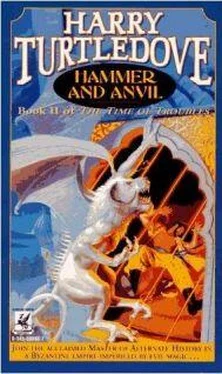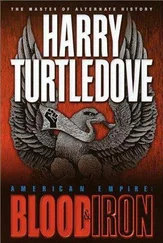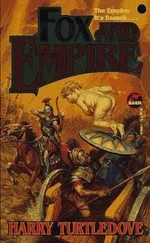So did the elder Maniakes. He stepped forward to fold the Avtokrator into an embrace-an awkward one, because Maniakes still held his newborn son in the crook of his elbow. "Ah, lad," the elder Maniakes said, his voice heavy with grief, "I lost your mother in childbed. I never dreamed the same ill-luck would strike you and your lady, too."
"I feared it," Maniakes said dully. "After she bore Evtropia, the midwife warned her-warned me-she shouldn't have another. I would have been content to see the throne come down to a brother or a cousin or a nephew, but Niphone insisted that she try to bear a son to succeed me. And so she did, but the price-"
Kourikos and Phevronia came out into the hallway. The face of the logothete of the treasury was even more pinched and drawn than usual; Phevronia, her hair all unpinned, looked haggard and frightened. Kourikos stammered slightly as he spoke, as if the words did not want to pass his lips: "Your Majesty, I pray you, tell me I have misunderstood your words to your father."
Maniakes could hardly blame him. "Behold your grandson, father-in-law of mine," he said, and held Likarios out to Kourikos. The logothete took the baby with a sure touch that said he hadn't forgotten everything he had once known about children. Maniakes went on, "More than anything, I wish I could tell you-tell you and your lady-that you have misunderstood me. The truth is, I cannot; you have not. Niphone… your daughter… my wife-" He looked down at the floor. The hunting mosaic blurred as his eyes filled with tears.
Phevronia wailed. Kourikos put his free arm around her. She buried her face in his shoulder and wept like a soul damned to the eternal ice.
Gravely Kameas said, "I share your sorrow, your Majesty. I shall set in train arrangements for care of the young Majesty here and, with your permission, shall also begin preparations for the Empress' funeral obsequies. The weather remains cool, so the matter is not so urgent as it might otherwise be, but nevertheless-"
Phevronia wept harder yet. Kourikos started to bristle at the vestiarios' suggestion, then seemed to slump in on himself. He nodded jerkily. So did Maniakes. You have to go on, he told himself, and wondered how to make himself believe it.
As with anything else connected with the imperial household, the funeral carried a heavy weight of ceremonial, in this case melancholy ceremonial. The limestone sarcophagus in which Niphone was laid to rest bore carved scenes showing the bridge of the separator, the narrow passage souls walked after death. Demons snatched those who failed Phos' stern judgment and fell from the bridge, dragging them down to Skotos' ice. The last panel of the relief, though, showed one soul, intended to represent Niphone, winging upward toward Phos' eternal light.
Deceased Avtokrators and their kinsfolk were by ancient tradition interred beneath a temple in the western part of Videssos the city, not far from the Forum of the Ox, the capital's ancient cattle market. The temple, dedicated to the memory of the holy Phravitas, an ecumenical patriarch from before the days of Stavrakios, was ancient, too, though not so ancient as the Forum of the Ox.
Kameas produced for Maniakes a robe of black silk shot through with silver threads. The Avtokrator had no idea of where the robe came from; it certainly did not hang in the closet adjoining the imperial bedchamber. It smelled strongly of camphor, and its wrinkles and creases were as firmly set as if it were made of metal rather than fabric.
"Be gentle with it, your Majesty," Kameas said. "The cloth is fragile these days."
"As you say," Maniakes answered. "How old is it, anyhow?"
The vestiarios' shrug made his several chins wobble. "I apologize, your Majesty, but I cannot tell you. My predecessor at this post, the esteemed Isoes, was himself ignorant of that, and told me his predecessor did not know the answer, either. I also cannot tell you how long the answer has been lost. That might have happened in the days of Isoes' predecessor, or it might have been a hundred years before his time."
Maniakes fingered the silk. He doubted the mourning robe had been new in his grandfather's days, but had no way to prove that. Kameas also brought him polished black leather covers for his boots. Strips cut in them let a little of the imperial crimson shine through; even in mourning, the Avtokrator remained the Avtokrator. But, looking down at himself, Maniakes saw that he made a somber spectacle indeed.
The other mourners in the funeral party-Kourikos and Phevronia, the elder Maniakes, Parsmanios, Rhegorios, Lysia, and Symvatios-wore unrelieved black. The horses drawing the wagon on which the sarcophagus lay were also black-though Maniakes knew a groom of the imperial stables had carefully painted over a white blaze on one of the animals.
Also in black surcoats, with black streamers hanging from their spears, were the guardsmen who marched with the mourners and the funeral wagon. For the day, the parasol-bearers who preceded the Avtokrator in all his public appearances carried black canopies rather than their usual colorful ones.
As the funeral party approached the plaza of Palamas, Maniakes saw it was packed with people; the folk of Videssos the city were eager for any spectacle, no matter how sorrowful. Some of the people wore black to show their sympathy for the Avtokrator. Others had dressed in their holiday best: for them, one show was as good as another.
At the edge of the plaza nearest the palace quarter waited the ecumenical patriarch Agathios. His regalia had not changed; he still wore the blue boots and a cloth-of-gold robe encrusted with pearls and gems, as he would have at a wedding or any joyous occasion. But his face was somber as he prostrated himself before Maniakes. "Your Majesty, I beg you to accept my condolences for your tragic loss."
"Thank you, most holy sir," Maniakes answered. "Let's get on with it, shall we?" As soon as the words were out of his mouth, he regretted them; Agathios looked scandalized. Maniakes had not meant anything more than wanting to have the funeral over so he could grieve in private, but anything an Avtokrator said that could be misinterpreted probably would be, and he knew too well he had left himself open to such misinterpretation.
Without a word to Maniakes, Agathios turned away and took his place at the head of the mournful procession. He called in a great voice to the crowds filling the plaza of Palamas. "Stand aside, people of Videssos! Make way for the last journey of Niphone, once Empress of the Videssians, now bathed in Phos' eternal light."
"May it be so," the people answered, their voices rising and falling like the surf that beat against the seawall. As best they could, they did clear a path through the plaza. Where their own efforts were not enough, the guards moved them aside with their spearshafts.
Even as the people moved back to make way for the funeral procession, they also pushed forward to speak a word of consolation to Maniakes or to his family. Some of them also pressed forward to get a glimpse of Niphone, who lay pale and still and forever unmoving inside the sarcophagus.
"I pray she knew she gave you a son," a man said to Maniakes. He nodded, though Niphone had known nothing of the sort.
A few of the folk in the plaza kept their hands at the hems of their tunics, ready to use the garments to help catch any largess the Avtokrator might choose to dispense. That thought had never entered his mind, not for today's occasion. He shook his head, bemused at the vagaries of human nature to which his position exposed him.
Though the plaza of Palamas was far wider than Middle Street, the procession had better going on the capital's main thoroughfare. The crowds there stayed off the street itself and under the covered colonnades to either side. When Maniakes glanced up, he saw a goodly number of people atop the colonnades as well, peering down at him and at the woman who had given him two children in just over a year and a half and now would give no more ever again.
Читать дальше












